

Tech Bubble Burst, Startup Platitudes, Hiring Process and Founder Resilience. Winter Is (Probably) Coming (Soon) Duck everyone.

It’s a bubble. Or something close to one. And the good times are going to slow down. Probably soon. That’s the gist of a recent interview that venture capitalist Bill Gurley gave. Making money is better than losing money, but losing money — burn — can be the prudent and responsible thing to do. Why Recruiting Isn’t Over When an Employee Accepts Your Offer. Recruiting.
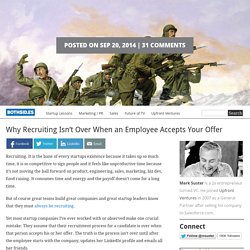
It is the bane of every startups existence because it takes up so much time, it is so competitive to sign people and it feels like unproductive time because it’s not moving the ball forward on product, engineering, sales, marketing, biz dev, fund raising. It consumes time and energy and the payoff doesn’t come for a long time. But of course great teams build great companies and great startup leaders know that they must always be recruiting. Yet most startup companies I’ve ever worked with or observed make one crucial mistake: They assume that their recruitment process for a candidate is over when that person accepts his or her offer. The truth is the process isn’t over until after the employee starts with the company, updates her LinkedIn profile and emails all her friends. In fact, it’s worse than that. Recruitment is war and the enemy (people competing for talent) won’t accept defeat easily.
25 Pieces of Bullshit You Hear About Startups. This list needs no explanation: 1) You need a technical co-founder. 2) We're really interested in what you're up to, but would love to see just a little more traction before we fund it. 3) No one else can do this. 4) We decided not to charge our initial customers. 5) It's easier to get funded on the west coast. 6) This is projected to be a $54 billion dollar industry by 2019.
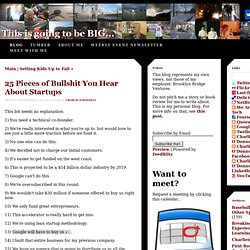
Startups Don’t Die, They Commit Suicide. Justin Kan is the founder of Justin.tv and Socialcam.
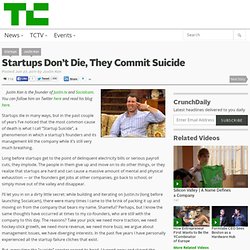
You can follow him on Twitter here and read his blog here. Startups die in many ways, but in the past couple of years I’ve noticed that the most common cause of death is what I call “Startup Suicide”, a phenomenon in which a startup’s founders and its management kill the company while it’s still very much breathing. Long before startups get to the point of delinquent electricity bills or serious payroll cuts, they implode.
The people in them give up and move on to do other things, or they realize that startups are hard and can cause a massive amount of mental and physical exhaustion — or the founders get jobs at other companies, go back to school, or simply move out of the valley and disappear. I’ll let you in on a dirty little secret: while building and iterating on Justin.tv (long before launching Socialcam), there were many times I came to the brink of packing it up and moving on from the company that bears my name. Full stack startups. Many of today’s most exciting startups were tried before in a different form.
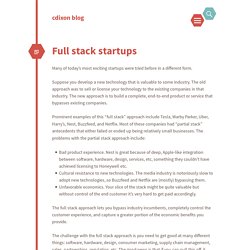
Suppose you develop a new technology that is valuable to some industry. The old approach was to sell or license your technology to the existing companies in that industry. The new approach is to build a complete, end-to-end product or service that bypasses existing companies. Prominent examples of this “full stack” approach include Tesla, Warby Parker, Uber, Harry’s, Nest, Buzzfeed, and Netflix. Most of these companies had “partial stack” antecedents that either failed or ended up being relatively small businesses. Bad product experience. The full stack approach lets you bypass industry incumbents, completely control the customer experience, and capture a greater portion of the economic benefits you provide. The challenge with the full stack approach is you need to get good at many different things: software, hardware, design, consumer marketing, supply chain management, sales, partnerships, regulation, etc.
The Right Kind of Ambition. Some say that I’m they favouriteBut I aint hearing none of thatI’m about my team hoYoung money running back—Drake, 4 My Town Birdman - 4 My Town (Play Ball) | Listen for free at bop.fm In my last post, I mentioned that you should strive to hire people with the right kind of ambition.
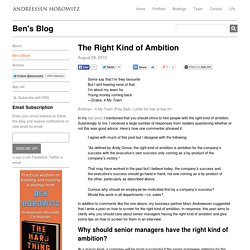
Surprisingly to me, I received a large number of responses from readers questioning whether or not this was good advice. Here’s how one commenter phrased it: I agree with much of this post but I disagree with the following:"As defined by Andy Grove, the right kind of ambition is ambition for the company’s success with the executive’s own success only coming as a by-product of the company’s victory. " In addition to comments like the one above, my business partner Marc Andreessen suggested that I write a post on how to screen for the right kind of ambition.
Why should senior managers have the right kind of ambition? Screening for the right kind of ambition Final Thought.